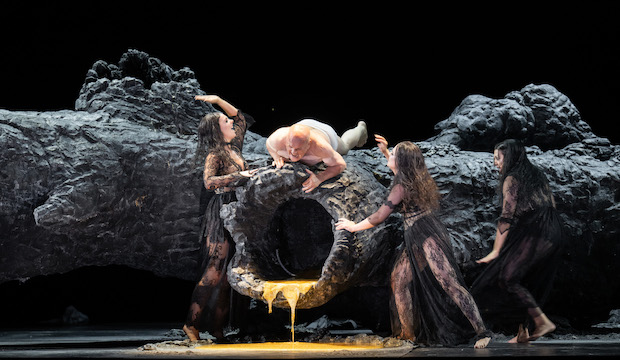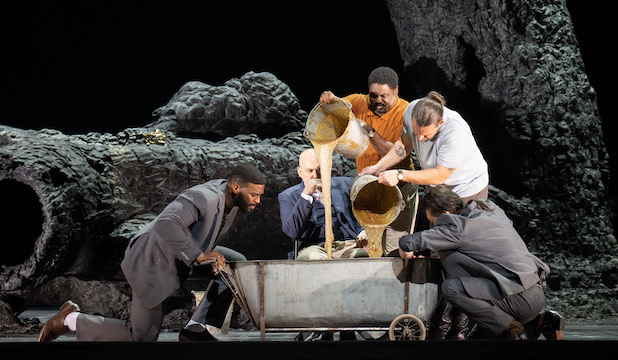Das Rheingold, Royal Opera House review ★★★★★
The despoliation of the Earth and the humiliation of women are underlying themes in a new production launching Covent Garden 2023/24
Das Rheingold launches Covent Garden's new Ring cycle. Photo: Monika Rittershaus
Richard Wagner wanted the music at the beginning of his epic Ring cycle to emerge from complete darkness, and built his own theatre with a concealed orchestra pit to achieve the effect. Not so Barrie Kosky, the director of Das Rheingold which opens the Royal Opera House’s season.
As the audience arrives, the curtain is already raised, revealing large amorphous shapes under dust sheets. When the house lights dim, a naked, elderly woman with long grey hair crosses the stage in complete silence. This is Erda, the Earth Goddess, played by veteran actress Rose Knox-Peebles,who, in this production, is ever present. (Her singing is gloriously provided from offstage by the rich voice of Wiebke Lehmkuhl.)
Erda’s appearance gives us two clues to the themes Kosky is going to explore – the despoliation of the Earth and the exploitation of women, both carried out by men in pursuit of wealth and power.
As the orchestra strikes up, the shattered remains of the World Ash Tree are revealed. In Nordic mythology it is the source of all knowledge, and fatally damaged when Wotan tore a branch from it to fashion his spear. Disappointingly, the Ash Tree is the single set for the whole evening, the curtain lowered and raised to reveal minimal scene changes for Valhalla, the Rhein or the underground world of the mining race of Nibelungs, helped by Alessandro Carletti’s stark and dramatic lighting.

The humiliation of Alberich by the Rhinemaidens. Photo: Monika Rittershaus
The Rhinemaidens look decidedly landlocked, popping in and out of holes in the fallen tree. They do, however, make a thorough job of humiliating the randy Nibelung, Alberich (Christopher Purves, giving one of the notable performances of the evening). Persuading him to don a negligée like theirs, they abandon him with his willy hanging out. Alberich’s desire for revenge, by stealing their Rhinegold, has never looked more convincing.
The Rhinegold itself is not a shiny lump of metal but, in one of the most striking images in the production, a slimy sludge that oozes from one of the openings in the Ash Tree, like untreated sewage invading an English beach. Gold in this production is literally disgusting.
Valhalla is represented, distantly, by Wotan (the stentorian Christopher Maltman), who looks at architectural drawings. Wotan and family appear to be enjoying a polo picnic, a tablecloth casually thrown over the Ash Tree, in a black-and-white world with hints of pre-war Hollywood. Wotan, wearing a monocle-patch and riding boots (understated costumes by Victoria Behr), suggests a dictatorial film director.

Gold is filthy lucre in Barrie Kosky's production. Photo: Monika Rittershaus
Fasolt (strongly sung by the Korean Insung Sim) and Fafner (luxury casting in Soloman Howard, surely a future Wotan himself) arrive to carry away Freia, the goddess of youth, whom Wotan, at his most patriarchal, has promised to them as their fee for building Valhalla. The giants are persuaded to take an alternative fee – enough gold to block Freia from their sight. The scene in which Freia (the very game Kiandra Howarth) is jammed into a tin bath against her will and covered in a cloacal gold sludge is truly horrifying. Wotan is forced to watch the consequences of his actions, like Harvey Weinstein being confronted by one of his victims.
Sean Panikkar as Loge, with his matinée idol looks and snazzy nightclub black suit seemed uncomfortable on first night with the dancing, giggling interpretation of his rôle, but got one of the biggest cheers when he took his curtain call. The biggest cheer of all went to Christopher Purves’s heroic performance of Alberich whom he managed to make almost genial, although he hadn’t reserved enough voice to make his final curse of the Ring sufficiently terrifying.
Antonio Pappano, starting his final season as ROH music director before moving on to the Barbican as chief conductor of the London Symphony Orchestra, conducts vividly and energetically, with never a dull moment – by no means a given in Wagner.
So an interesting beginning, with germs of ideas which may develop over the next three operas. Complete cycles are planned for 2028. Are there enough ideas for a memorable Ring cycle to develop with its own identity? Ask me again in five years' time.
Das Rheingold is sung in German with English surtitles. Further performances are on 14, 17, 20, 23, 26, 29 Sept. Click here to book. The performance on Wed 20 Sept is screened live across London and worldwide at 7:15PM, and repeated at 2PM on Sun 24 Sept. Click here to book
As the audience arrives, the curtain is already raised, revealing large amorphous shapes under dust sheets. When the house lights dim, a naked, elderly woman with long grey hair crosses the stage in complete silence. This is Erda, the Earth Goddess, played by veteran actress Rose Knox-Peebles,who, in this production, is ever present. (Her singing is gloriously provided from offstage by the rich voice of Wiebke Lehmkuhl.)
Erda’s appearance gives us two clues to the themes Kosky is going to explore – the despoliation of the Earth and the exploitation of women, both carried out by men in pursuit of wealth and power.
As the orchestra strikes up, the shattered remains of the World Ash Tree are revealed. In Nordic mythology it is the source of all knowledge, and fatally damaged when Wotan tore a branch from it to fashion his spear. Disappointingly, the Ash Tree is the single set for the whole evening, the curtain lowered and raised to reveal minimal scene changes for Valhalla, the Rhein or the underground world of the mining race of Nibelungs, helped by Alessandro Carletti’s stark and dramatic lighting.

The humiliation of Alberich by the Rhinemaidens. Photo: Monika Rittershaus
The Rhinemaidens look decidedly landlocked, popping in and out of holes in the fallen tree. They do, however, make a thorough job of humiliating the randy Nibelung, Alberich (Christopher Purves, giving one of the notable performances of the evening). Persuading him to don a negligée like theirs, they abandon him with his willy hanging out. Alberich’s desire for revenge, by stealing their Rhinegold, has never looked more convincing.
The Rhinegold itself is not a shiny lump of metal but, in one of the most striking images in the production, a slimy sludge that oozes from one of the openings in the Ash Tree, like untreated sewage invading an English beach. Gold in this production is literally disgusting.
Valhalla is represented, distantly, by Wotan (the stentorian Christopher Maltman), who looks at architectural drawings. Wotan and family appear to be enjoying a polo picnic, a tablecloth casually thrown over the Ash Tree, in a black-and-white world with hints of pre-war Hollywood. Wotan, wearing a monocle-patch and riding boots (understated costumes by Victoria Behr), suggests a dictatorial film director.

Gold is filthy lucre in Barrie Kosky's production. Photo: Monika Rittershaus
Fasolt (strongly sung by the Korean Insung Sim) and Fafner (luxury casting in Soloman Howard, surely a future Wotan himself) arrive to carry away Freia, the goddess of youth, whom Wotan, at his most patriarchal, has promised to them as their fee for building Valhalla. The giants are persuaded to take an alternative fee – enough gold to block Freia from their sight. The scene in which Freia (the very game Kiandra Howarth) is jammed into a tin bath against her will and covered in a cloacal gold sludge is truly horrifying. Wotan is forced to watch the consequences of his actions, like Harvey Weinstein being confronted by one of his victims.
Sean Panikkar as Loge, with his matinée idol looks and snazzy nightclub black suit seemed uncomfortable on first night with the dancing, giggling interpretation of his rôle, but got one of the biggest cheers when he took his curtain call. The biggest cheer of all went to Christopher Purves’s heroic performance of Alberich whom he managed to make almost genial, although he hadn’t reserved enough voice to make his final curse of the Ring sufficiently terrifying.
Antonio Pappano, starting his final season as ROH music director before moving on to the Barbican as chief conductor of the London Symphony Orchestra, conducts vividly and energetically, with never a dull moment – by no means a given in Wagner.
So an interesting beginning, with germs of ideas which may develop over the next three operas. Complete cycles are planned for 2028. Are there enough ideas for a memorable Ring cycle to develop with its own identity? Ask me again in five years' time.
Das Rheingold is sung in German with English surtitles. Further performances are on 14, 17, 20, 23, 26, 29 Sept. Click here to book. The performance on Wed 20 Sept is screened live across London and worldwide at 7:15PM, and repeated at 2PM on Sun 24 Sept. Click here to book
TRY CULTURE WHISPER
Receive free tickets & insider tips to unlock the best of London — direct to your inbox
| What | Das Rheingold, Royal Opera House review |
| Where | Royal Opera House, Bow Street, Covent Garden, London, WC2E 9DD | MAP |
| Nearest tube | Covent Garden (underground) |
| When |
11 Sep 23 – 29 Sep 23, Seven performances, start times vary. Running time 2hr 30min with no interval |
| Price | £193-£325 |
| Website | Click here for details and booking |